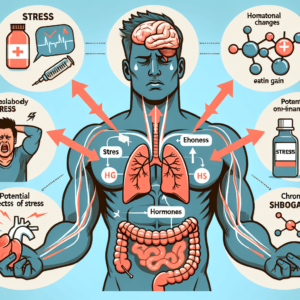Losing weight is a common goal for many, but it’s important to approach it in a healthy and sustainable way. This article will explore the concept of a healthy rate of weight loss and provide you with valuable insights and guidance on how to achieve your goals without compromising your well-being. Whether you’re just starting your weight loss journey or are looking to fine-tune your existing plan, understanding the ideal rate of weight loss is crucial. So, let’s uncover the key factors that contribute to a healthy rate of weight loss and enable you to make informed decisions on your path to a healthier you.

Factors Affecting Weight Loss Rate
Body Composition
When it comes to weight loss, your body composition plays a crucial role. Body composition refers to the amount of fat mass and lean mass your body contains. Individuals with a higher percentage of lean mass tend to have a higher metabolic rate, which can contribute to a faster weight loss rate. On the other hand, individuals with a higher percentage of fat mass may find it more challenging to lose weight quickly.
Metabolism
Metabolism refers to the chemical processes that occur in your body to convert food into energy. Each individual has a unique metabolic rate, which is influenced by various factors such as genetics, muscle mass, and activity level. Those with a higher metabolism tend to burn more calories at rest, making it easier to lose weight. However, it’s important to note that metabolism can be influenced by lifestyle and dietary factors.
Gender
Gender can also impact weight loss rate. In general, men tend to have a higher metabolic rate and more muscle mass compared to women. As a result, men may experience a slightly faster weight loss rate than women. However, it’s essential to focus on individual progress rather than comparing yourself to others.
Age
Age is another factor that can affect weight loss rate. As we get older, our metabolism naturally tends to slow down. This can make it more challenging to lose weight quickly. Additionally, hormonal changes that occur with age can also impact weight loss efforts. However, maintaining a healthy lifestyle and making appropriate dietary and exercise adjustments can still result in successful weight loss.
Overall Health
Your overall health plays a significant role in your weight loss journey. Certain medical conditions, medications, and hormonal imbalances can affect your metabolism and make weight loss more challenging. It’s important to consult with a healthcare professional to address any underlying health issues and develop a weight loss plan tailored to your specific needs.
Recommended Weight Loss Rate
Slow and Steady Wins the Race
When it comes to weight loss, it’s important to adopt a slow and steady approach. Rapid weight loss may seem appealing, but it’s often not sustainable in the long run and can be detrimental to your health. Aim for gradual weight loss that allows your body to adjust and maintain a healthy state.
Aim for 1-2 Pounds per Week
A safe and realistic weight loss goal is to aim for 1-2 pounds per week. This moderate rate of weight loss is achievable for most individuals and can lead to long-term success. Remember, weight loss is a journey, and consistency is key.
The 10% Rule
An effective strategy for weight loss is to aim for a 10% reduction in body weight. Losing 10% of your current weight can have significant health benefits, such as improved blood pressure and cholesterol levels. Breaking your weight loss journey into smaller, attainable goals can help keep you motivated and focused.
Consistency is Key
Consistency is essential when it comes to weight loss. It’s important to develop healthy habits and stick to them over time. Consistently making healthy food choices, engaging in regular physical activity, and practicing self-care will contribute to sustainable weight loss and overall well-being.
Potential Risks of Rapid Weight Loss
Muscle Loss
Rapid weight loss can increase the risk of muscle loss. When you lose weight quickly, your body may break down muscle tissue for energy. This can lead to a decrease in metabolism and a potential loss of strength. To preserve muscle mass, it’s important to engage in strength training exercises and consume adequate protein during your weight loss journey.
Nutritional Deficiencies
Extreme calorie restriction and fad diets associated with rapid weight loss can result in nutritional deficiencies. Restrictive eating patterns may limit your intake of essential nutrients, leading to fatigue, weakened immune function, and other health issues. It’s crucial to prioritize a balanced and varied diet that provides all the necessary nutrients for optimal health.
Metabolic Adaptation
When you lose weight rapidly, your body may go into “starvation mode” and adapt by slowing down your metabolism. This can make it harder to continue losing weight and may lead to weight regain once normal eating patterns are resumed. It’s important to focus on sustainable lifestyle changes rather than quick fixes to avoid metabolic adaptation.
Gallstones
Rapid weight loss can increase the risk of developing gallstones. When you lose weight quickly, the liver releases more cholesterol into the bile, which can lead to the formation of gallstones. To minimize the risk, it’s important to lose weight at a moderate pace and maintain a healthy diet that includes adequate amounts of dietary fiber.
Yo-Yo Dieting
Engaging in frequent cycles of weight loss and weight regain, also known as yo-yo dieting, can have negative impacts on your health. Yo-yo dieting can disrupt your metabolism, increase the risk of nutrient deficiencies, and negatively impact your mental and emotional well-being. It’s crucial to adopt a sustainable approach to weight loss to avoid the harmful effects of yo-yo dieting.
Benefits of Gradual Weight Loss
Sustainable Lifestyle Changes
Gradual weight loss allows you to establish sustainable lifestyle changes that can be maintained in the long run. By making gradual adjustments to your diet and physical activity habits, you’re more likely to develop healthy routines that promote lasting weight loss and overall well-being.
Preservation of Lean Body Mass
Losing weight gradually helps preserve lean body mass, including muscle mass. By prioritizing regular strength training exercises and consuming adequate protein, you can support muscle growth and maintenance. This is important for long-term weight management and overall body composition.
Improved Long-term Weight Maintenance
Research has shown that individuals who lose weight gradually are more likely to keep the weight off in the long term. This is because gradual weight loss allows your body to adjust and adapt to the changes, making it easier to sustain your weight loss efforts over time.
Reduced Risk of Nutritional Deficiencies
Gradual weight loss allows for a balanced and varied diet that includes all the necessary nutrients. By focusing on nourishing your body with a wide range of foods, you can reduce the risk of nutritional deficiencies that are commonly associated with extreme and restrictive diets.

Methods for Achieving Healthy Weight Loss
Balanced Diet
A balanced diet is essential for healthy weight loss. Focus on consuming a variety of nutrient-dense foods, including fruits, vegetables, whole grains, lean proteins, and healthy fats. Portion control and mindful eating can also help you maintain a calorie deficit without feeling deprived.
Regular Physical Activity
Regular physical activity is important for both weight loss and overall health. Aim for a combination of cardiovascular exercises, such as walking, jogging, or cycling, and strength training exercises to build muscle and boost your metabolism. Find activities that you enjoy to make exercise a sustainable part of your lifestyle.
Behavioral Changes
Sustainable weight loss often requires behavioral changes. This may include identifying and addressing emotional eating triggers, practicing portion control, and developing healthy coping mechanisms for stress or boredom. Seek support from a therapist or counselor if needed to help navigate these behavioral changes.
Supportive Environment
Creating a supportive environment can greatly impact your weight loss journey. Surround yourself with people who support your goals and encourage healthy habits. Additionally, consider removing or minimizing triggers in your environment that may promote unhealthy eating behaviors.
Professional Guidance
Seeking professional guidance can provide you with the knowledge and support needed for successful weight loss. Consulting a registered dietitian, personal trainer, or healthcare professional can help you develop an individualized plan tailored to your specific needs and goals.
Importance of Individualized Approach
Consulting a Healthcare Professional
Before starting any weight loss journey, it’s important to consult with a healthcare professional. They can help assess your overall health, address any underlying medical issues, and provide guidance on the most appropriate weight loss strategies for you.
Consideration of Personal Factors
Individual factors, such as your current weight, health conditions, lifestyle, and preferences, should be taken into consideration when developing a weight loss plan. Each person is unique, and what works for one individual may not work for another. By considering personal factors, you can create a plan that is realistic and sustainable for you.
Adapting to Personal Lifestyle
Weight loss should be approached as a long-term lifestyle change rather than a short-term solution. It’s important to develop habits and strategies that fit into your personal lifestyle and can be maintained over time. This will increase the likelihood of achieving and maintaining your weight loss goals.
Understanding Plateaus and Stalls
The Role of Plateaus in Weight Loss
Plateaus are a common occurrence during weight loss journeys. They refer to periods when your weight remains stagnant despite ongoing efforts. Plateaus can be frustrating, but they are a natural part of the weight loss process. They often occur when your body adjusts to the changes and may require further adjustments to continue progressing.
Strategies to Overcome Plateaus
To overcome plateaus, it’s important to reassess your weight loss plan. Consider increasing physical activity, changing up your exercise routine, or adjusting your calorie intake. Additionally, it can be helpful to focus on non-scale victories, such as increased energy levels or improved body composition, to stay motivated during plateaus.
Monitoring Progress Safely and Effectively
Setting Realistic Goals
Setting realistic goals is crucial for monitoring progress effectively. Focus on goals that are specific, measurable, achievable, relevant, and time-based (SMART). By setting realistic goals, you can track your progress and celebrate small victories along the way.
Measuring Body Composition
Tracking changes in body composition, such as body fat percentage and inches lost, can be more insightful than solely relying on the number on the scale. Consider using tools like body fat calipers or smart scales that can provide a more comprehensive view of your progress.
Tracking Food Intake and Physical Activity
Keeping a food journal and tracking your physical activity can help you identify patterns and make adjustments to your weight loss plan. There are various apps and online tools available that make tracking simple and convenient.
Seeking Support
Seeking support from friends, family, or a support group can be beneficial during your weight loss journey. Sharing your goals, challenges, and successes with others can help keep you motivated and accountable. Additionally, consider the support of a healthcare professional or a registered dietitian who can provide guidance and encouragement.
Healthy Weight Loss vs. Unhealthy Weight Loss
Warning Signs of Unhealthy Weight Loss
There are warning signs that may indicate unhealthy weight loss practices. These include rapid and extreme weight loss, excessive calorie restriction, obsession with food and weight, and engaging in unhealthy eating habits. It’s important to prioritize your health and well-being throughout your weight loss journey.
Dangers of Extreme Diets or Methods
Extreme diets or weight loss methods can have negative effects on your physical and mental health. They may lead to nutrient deficiencies, metabolic imbalances, muscle loss, and an increased risk of developing disordered eating patterns. Choose sustainable and balanced approaches to weight loss that prioritize your long-term health.
Recognizing and Avoiding Weight Loss Scams
Weight loss scams are prevalent in the health and wellness industry. These scams often promise unrealistic results through the use of supplements, pills, or specific products. It’s important to be cautious and skeptical of any weight loss claims that seem too good to be true. Stick to evidence-based approaches and consult with a healthcare professional before trying any new weight loss products or programs.
Conclusion
Achieving and maintaining a healthy weight is a journey that requires patience, perseverance, and a personalized approach. By considering factors such as body composition, metabolism, gender, age, and overall health, you can determine a realistic weight loss rate that works for you. Gradual weight loss offers numerous benefits, including sustainable lifestyle changes, preservation of lean body mass, improved long-term weight maintenance, and reduced risk of nutritional deficiencies. By adopting a balanced diet, engaging in regular physical activity, making behavioral changes, and seeking supportive guidance, you can achieve healthy weight loss and improve your overall well-being. Remember to prioritize your health and consult with a healthcare professional to ensure the most effective and safe weight loss journey.



